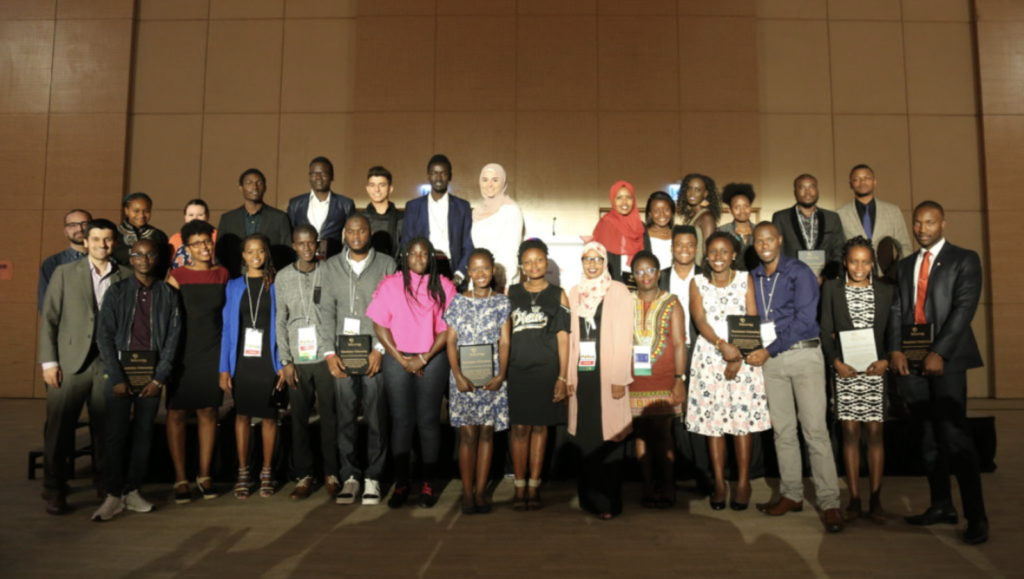Chinese consumer electronics company Honor is set to unveil its latest lineup of smart devices for the South African market. How about we forecast…
Winners of 2018 Resolution Social Venture Challenge announced

Fifteen teams comprising 32 African social entrepreneurs have been selected as winners of the 2018 Resolution Social Venture Challenge.
The challenge is an initiative of the Mastercard Foundation and The Resolution Project, a non-profit organisation which aims to foster youth leadership development through collaborative social entrepreneurship.
A total of 30 teams of Mastercard Foundation Scholars gathered in Kigali, Rwanda to compete in the challenge, for a fellowship that includes seed funding, mentorship, and access to a network of innovators seeking global change through high impact community projects.
The Resolution Social Venture Challenge winners will receive seed funding and mentorship to lead impactful projects in their communities
The winning projects address a wide range of challenges that Mastercard Foundation Scholars have observed first-hand in their respective communities. These include digital literacy, a lack of mental health support, access to sanitation and climate-smart agriculture.
In a statement yesterday (15 August), Mastercard Foundation manager of youth engagement and networks Ashley Collier said Africa’s young leaders are “brimming” with talent, ideas, energy, and a deep desire to have a positive impact on their communities.
“Yet few young people receive the support and tools they need to ensure a project or social venture they want to undertake is successful,” said Collier.
She added that by winning the Social Venture Challenge, the young leaders have earned the resources, network, mentorship, and capital they need to implement their venture and to maximise their impact.
The 2018 cohort of Social Venture Challenge winners include projects based in Kenya, Gambia, Uganda, Somaliland, Ghana, Sudan, Zimbabwe, Cameroon, Malawi, Tanzania and Lebanon.
Solace For Somaliland Girls (Somaliland): Claudette Igiraneza, Ubah Ali and Kawsar Muuse
Solace for Somaliland Girls Foundation is committed to reducing female genital mutilation in communities across Somaliland by increasing awareness about the dangers of this practice through training and education.
ZimDigester (Zimbabwe): Nicholas Tariro Toronga and Tinotenda Makuvire
ZimDigester plans to focus on renewable energy for home use at an affordable price in rural Zimbabwe.
The project will provide animal and food waste bio-digesters and deliver training to individual households on how to use the technology.
Girls Alive Uganda (Uganda): Marion Apio, Lokolimoe Susan Hilda and Mutoni Suzan
The enterprise aims to address the lack of sanitary materials for vulnerable girls in Uganda’s Tororo District.
The project will produce and distribute affordable sanitary pads to reduce high rates of menstrual-related school absenteeism, which remains a key barrier to girls’ education in Uganda.
Cactus Mama (Kenya): Faith Kipkemboi
Cactus Mama is a tele-mental health project. Kipkemboi aims to conduct research to provide evidence-based mental health support and services to Kenyan women who experience perinatal mood disorders during and after pregnancy.
This project also plans to deliver training and increase community awareness on perinatal mood disorders.
GamFruits (Gambia): Muhammad Mustapha Jammeh and Wuyeh Jobe
GamFruits is a climate-smart fruit farm in Gunjur, Gambia. The farm provides a hub for farmers to discuss matters affecting their daily farm practices, offering them a centre for outdoor learning in agriculture.
GamFruits will also produce and sell affordable fruit to members of the community.
Sua IT (Ghana): Richard Sewor, Golda Afoakwa and Douglas Amoo-Sargon
Sua IT seeks to advance computer literacy to school children in rural communities. Their project will use mobile ICT learning units powered by generators. The aim is to facilitate learning and skills development in ICT for these children.
Mobility is achieved by the ease of transferring the units from one community to another with minimal set-up time.
Green Shift (Lebanon): Salam Helwany and Houssian Al-Kaaby Al-Zaaby
Green Shift will address environmental issues in cities and rural areas. The project aims to implement sustainable strategies in various sectors, including solid waste management and clean water, promoting a green, healthy lifestyle among the population.
HappyDel (Kenya): Marvin Ambutu, Asterix Hassan and Brian Kirotich
HappyDel leverages high mobile and internet penetration in Africa to offer peer-to-peer counselling services for occupational therapy students and to raise awareness about mental health issues through social media platforms and a mobile app.
IGem (Sudan): Judith Lurit, Michael Lawrence and Emily Otoo-Quayson
The organisation uses earthenware water pots to trap debris, viruses and waterborne pathogens to provide clean drinking water to households without the addition of any substances or chemicals.
Let’s Fight Cancer: Screen It And Suppress It (Kenya): Joyline Chepkorir
This social venture will provide training for marginalised women on methods for early detection of breast and cervical cancer.
The organisation plans to also connect these women to community resources where they can receive free or low-cost screening and treatment once cancer is detected.
Mission Possible (Cameroon): Bleck Tabeh Titam, Elisabeth Bakoubolo and Komlan Kekeli Batchey
Mission Possible uses electromagnetic induction tools and 3D drone mapping to provide smallholder farmers with soil analysis and land profiling information, as well as planting, harvesting, and marketing advice.
With a better understanding of their soil, farmers can better predict environmental behaviours and leverage improved technique to increase crop yields.
Women For Peace Library (Malawi): Masateru Honest Mwambo
Women for Peace Library is a non-profit community library focused on strengthening literacy and communication skills among children and youth. The library will also host reading and writing competitions to promote literacy within the community.
One Urban Garden (Kenya): Laetitia Mukungu, Mutoni Shadadi and Jacquiline Maina
The enterprise aims to promote urban agriculture by establishing integrated, organic urban farms that will serve as production, training, and seedling distribution centres. The project will be piloted in Nairobi.
Rabbits for Education (Uganda): Myres Ndyabawe and Narinda Shirah
Myres Ndyabawe and Narinda Shirah aim to address primary school drop-out rates in a government-aided school in Kamwenge District, Uganda.
The project will provide participants with rabbits and will equip them with the skills they need to raise and care for them. The initiative also will help participants find a market, so they can generate income to support their education.
Youth Empowerment Initiative (Uganda): David Gai and Akot Arkanjelo
The Youth Empowerment Initiative is a student-run initiative that aims to build the capacity of youth and support primary school education in Yumbe District, Uganda.
The project recruits and trains youth mentors to provide mentorship to primary school children and provides textbooks and lesson revision materials to upper primary classes.
Featured image: 2018 Social Venture Challenge Winners in Kigali, Rwanda (Supplied)

